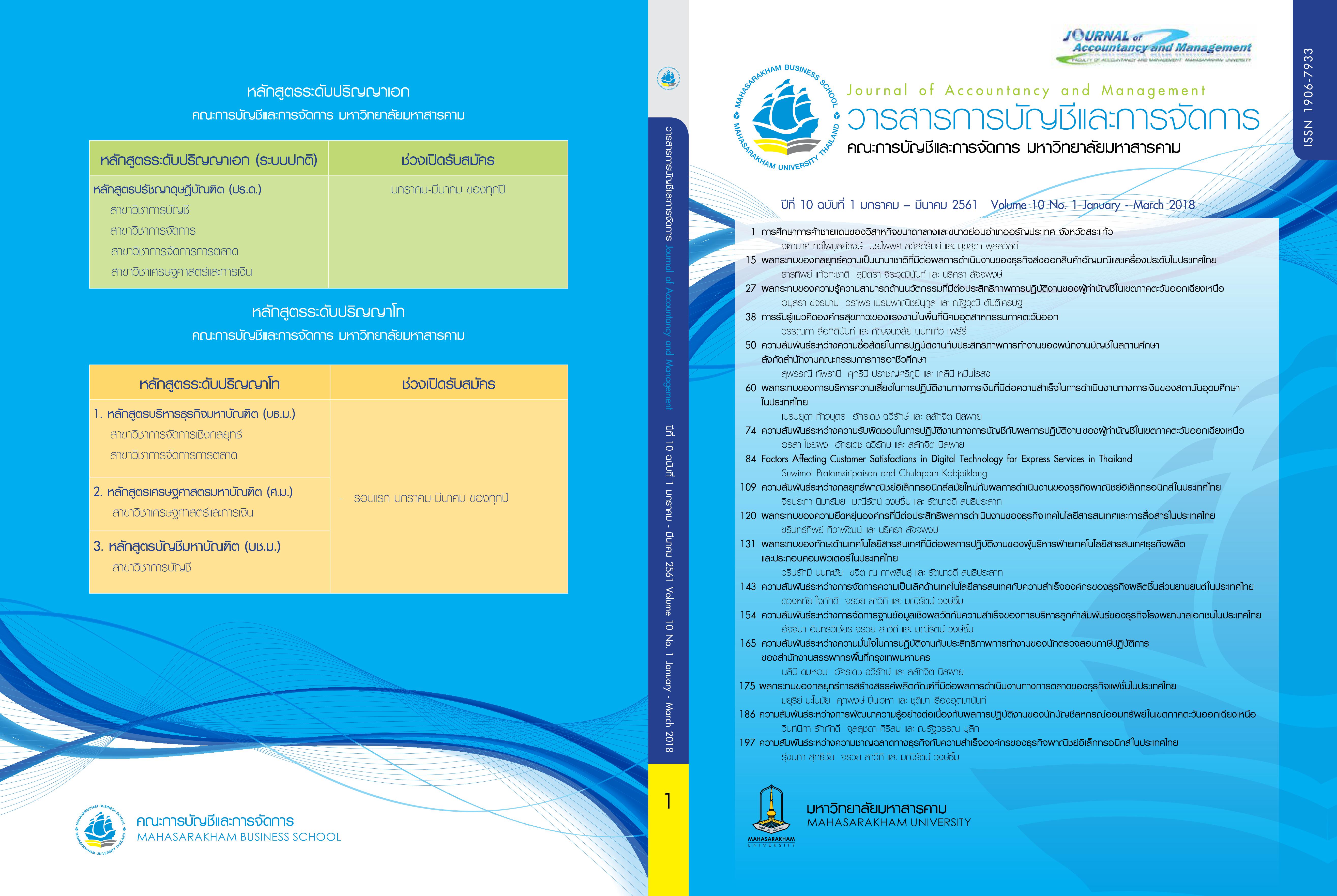ผลกระทบของความรู้ความสามารถด้านนวัตกรรมที่มีต่อประสิทธิภาพ การปฏิบัติงานของผู้ทำบัญชีในเขตภาคตะวันออกเฉียงเหนือ
Main Article Content
บทคัดย่อ
การวิจัยครั้งนี้มีวัตถุประสงค์เพื่อทดสอบผลกระทบของความรู้ความสามารถด้านนวัตกรรมที่มีต่อประสิทธิภาพการปฏิบัติงานของผู้ทำบัญชีในเขตภาคตะวันออกเฉียงเหนือ โดยทำการเก็บรวบรวมข้อมูลจากผู้ทำบัญชีผู้ทำบัญชีในเขตภาคตะวันออกเฉียงเหนือ จำนวน 96 คน สถิติที่ใช้ในการวิเคราะห์ข้อมูลได้แก่ การวิเคราะห์สหสัมพันธ์แบบพหุคูณ การวิเคราะห์การถดถอยอย่างง่าย และการวิเคราะห์การถดถอยแบบพหุคูณ ผลการวิจัย พบว่า 1) ความรู้ความสามารถด้านนวัตกรรม ด้านความคิดสร้างสรรค์ มีความสัมพันธ์และผลกระทบเชิงบวกกับประสิทธิภาพการปฏิบัติงานโดยรวม ด้านความพึงพอใจของผู้รับบริการ และด้านการประหยัดต้นทุน 2) ความรู้ความสามารถด้านนวัตกรรม ด้านการปฏิบัติ มีความสัมพันธ์และผลกระทบเชิงบวกกับประสิทธิภาพการปฏิบัติงานโดยรวม ด้านการประหยัดต้นทุน และด้านคุณภาพของงาน และ 3) ความรู้ความสามารถด้านนวัตกรรม ด้านการเรียนรู้ มีความสัมพันธ์และผลกระทบเชิงบวกกับประสิทธิภาพการปฏิบัติงานโดยรวม ด้านความพึงพอใจของผู้รับบริการ ด้านการประหยัดต้นทุน และด้านการทำงานเสร็จทันตามกำหนด ดังนั้น ผลลัพธ์ที่ได้จากการวิจัยนี้ สามารถนำไปใช้เป็นแนวทางให้แก่ผู้ทำบัญชีในการพัฒนาองค์ความรู้ใหม่ๆ ส่งผลให้งานมีประสิทธิภาพและประสิทธิผล และประยุกต์ใช้นวัตกรรมต่างๆ ให้เกิดประโยชน์ และมีคุณค่าสูงสุดนำองค์กรไปสู่เป้าหมายอย่างมีคุณภาพคุ้มค่ากับต้นทุนที่เกิดขึ้น สร้างความเชื่อมั่นต่อผู้เกี่ยวข้องทุกฝ่ายในการกำหนดทิศทางในการบริหาร และเพิ่มขีดความสามารถทางการแข่งขันภายใต้การเปลี่ยนแปลงตลอดเวลา
Downloads
Article Details
บทความที่ได้รับการตีพิมพ์เป็นลิขสิทธิ์ของวารสารการบัญชีและการจัดการ
ข้อความที่ปรากฏในบทความแต่ละเรื่องในวารสารวิชาการเล่มนี้เป็นความคิดเห็นส่วนตัวของผู้เขียนแต่ละท่านไม่เกี่ยวข้องกับมหาวิทยาลัยมหาสารคาม และคณาจารย์ท่านอื่นๆในมหาวิทยาลัยฯ แต่อย่างใด ความรับผิดชอบองค์ประกอบทั้งหมดของบทความแต่ละเรื่องเป็นของผู้เขียนแต่ละท่าน หากมีความผิดพลาดใดๆ ผู้เขียนแต่ละท่านจะรับผิดชอบบทความของตนเองแต่ผู้เดียว
เอกสารอ้างอิง
กรมส่งเสริมอุตสาหกรรม. (2552). ความหมาย และองค์ความรู้เกี่ยวกับนวัตกรรม. ค้นเมื่อ 20 มิถุนายน 2552, จาก http://library.dip.go.th/Industrial%20Innovation/www/inno1-01.html
ฉัตรรัชดา วิโรจน์รัตน์. (2549). ความสัมพันธ์ระหว่างความพึงพอใจในการทำงานกับประสิทธิผลการทำงานของนักบัญชีในวิสาหกิจขนาดกลางขนาดย่อมในเขตภาคตะวันออกเฉียงเหนือ. วิทยานิพนธ์ บช.ม. มหาสารคาม : มหาวิทยาลัยมหาสารคาม.
ชูศรี วงศ์รัตนะ. (2550). เทคนิคการใช้สถิติเพื่อการวิจัย (พิมพ์ครั้งที่ 10). นนทบุรี : ไทเนรมิตกิจ อินเตอร์โปรเกรสซิฟ.
ธีรยุส วัฒนาศุภโชค. (2549). นวัตกรรม : ติดอาวุธกลยุทธ์ทางการแข่งขัน. จุฬาลงกรณ์วารสาร, 17(66) : 18-20.
ยรรยง ธรรมธัชอารี. (2548). บริหารธุรกิจด้วยแนวคิดการบัญชี. กรุงเทพฯ : ซีเอ็ดยูเคชั่น.
เยาวลักษณ์ จิตต์วโรดม. (2548). นวัตกรรม : กุญแจหลักของการพัฒนาธุรกิจ. วารสารวิชาการหอการค้าไทย. 25(2) : 11-13.
วรรณภรณ์ อนุอิน. (2549). กลยุทธ์และปัจจัยบ่งชี้การพัฒนาสู่องค์กรการเรียนรู้ของห้องสมุดมหาวิทยาลัยในประเทศไทย. วิทยานิพนธ์ ศศ.ม. มหาสารคาม : มหาวิทยาลัยมหาสารคาม.
วีระวุฒิ วัจนะพุกกะ และอาทิตยา อรุณศรีโสภณ. (2552). ชุมชนแห่งนวัตกรรมและความคิดสร้างสรรค์. วารสารนักบริหาร, 30(3) : 25-30
วีรวุธ มาฆะศิรานนท์. (2553). กระบวนการเรียนรู้. กรุงเทพฯ : ธีระฟิล์ม และไซเท็กซ์.
สภาวิชาชีพบัญชีในพระบรมราชูปถัมภ์. (2554). ข้อบังคับสภาวิชาชีพบัญชี. ฉบับที่ 19 จรรยาบรรณของผู้ประกอบวิชาชีพบัญชี สภาวิชาชีพบัญชีในพระบรมราชูปถัมภ์.
สมใจ ลักษณะ. (2549). การพัฒนาประสิทธิภาพในการทำงาน. กรุงเทพฯ : ศูนย์การพิมพ์มหาวิทยาลัยราชภัฏสวนสุนันทา.
สวัสดิ์ พุ่มภักดี และวันชัย ประเสริฐศรี. (2550). การบัญชีขั้นต้น 1. กรุงเทพฯ : พัฒนาวิชาการ.
สุภาพร แจ่มศรี. (2554). ผลกระทบของการเรียนรู้ทางการบัญชีอย่างต่อเนื่องที่มีต่อผลการปฏิบัติงานของผู้ทำบัญชีในจังหวัดนครราชสีมา. วิทยานิพนธ์ บช.ม. มหาสารคาม : มหาวิทยาลัยมหาสารคาม.
สุวิทย์ เมษินทรีย์. (2548). Integrated Innovation. ค้นเมื่อ 13 มิถุนายน 2551, จาก http://www.tiger.co.th/intergrated.phd
เสน่ห์ จุ้ยโต. (2548). การบริหารนวัตกรรมแนวใหม่. นนทบุรี : มหาวิทยาลัยสุโขทัยธรรมาธิราช.
Aaker, D. A., Kumar, V., & Day. G. S. (2001). Marketing research. New York : John Wiley & Son.
Black, K. (2006). Business statistics for contemporary decision making. USA : John Wiley and Son.
Cronbach, B. J. (1972). Statistical inference for education researchers reading. MA : Addison – Wesley.
Lin, C. M., & Wei, C. C. (2005). Establishing the key performance indicators of knowledge management. Doctoral Thesis. Taiwan : School of Technology Management, Chung – Hua University.
Photis, M. P., & Meko, S. (2005). Logistics service provider-client relationships. Dissertation abstracts international. E41 : 179-200.


